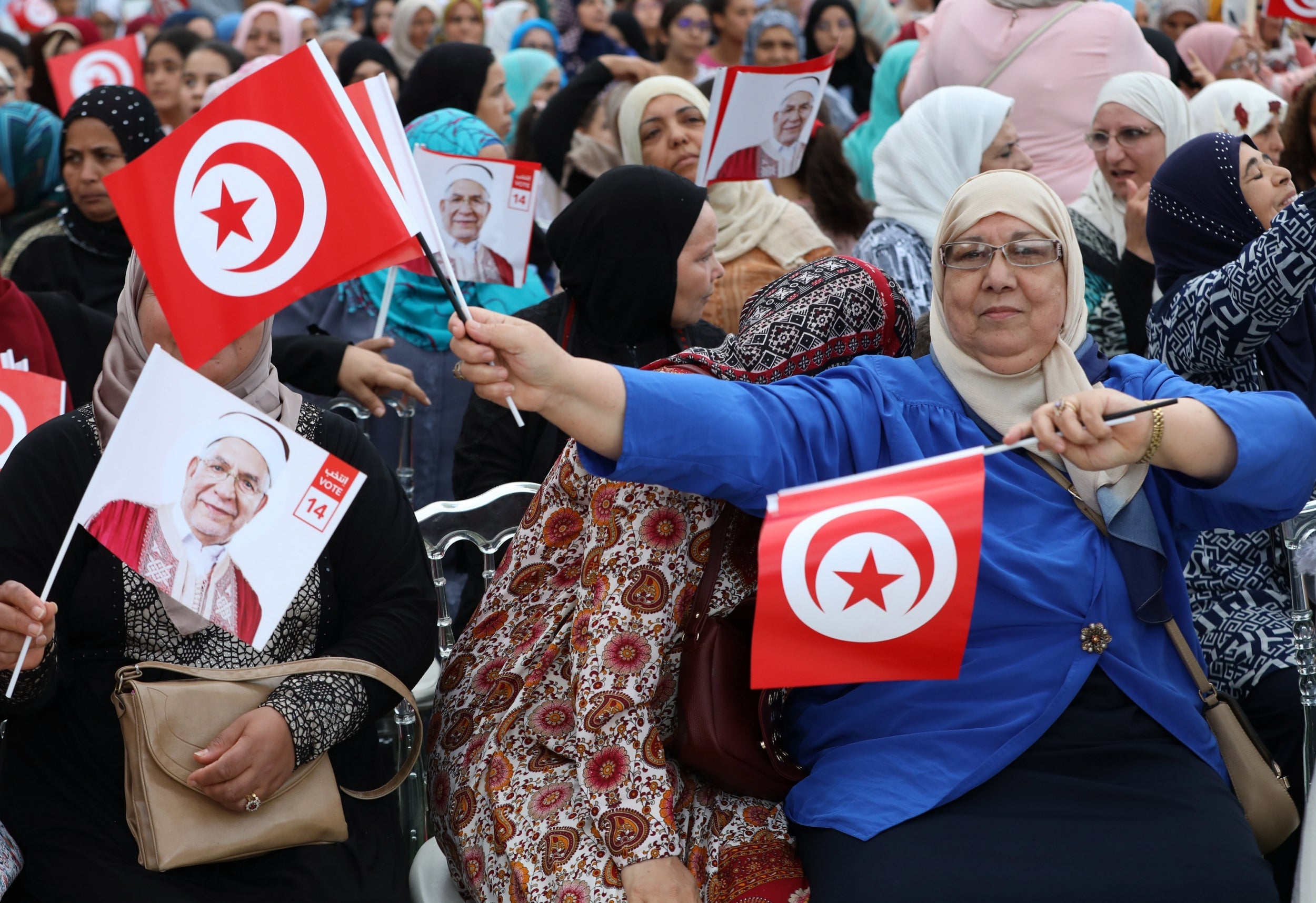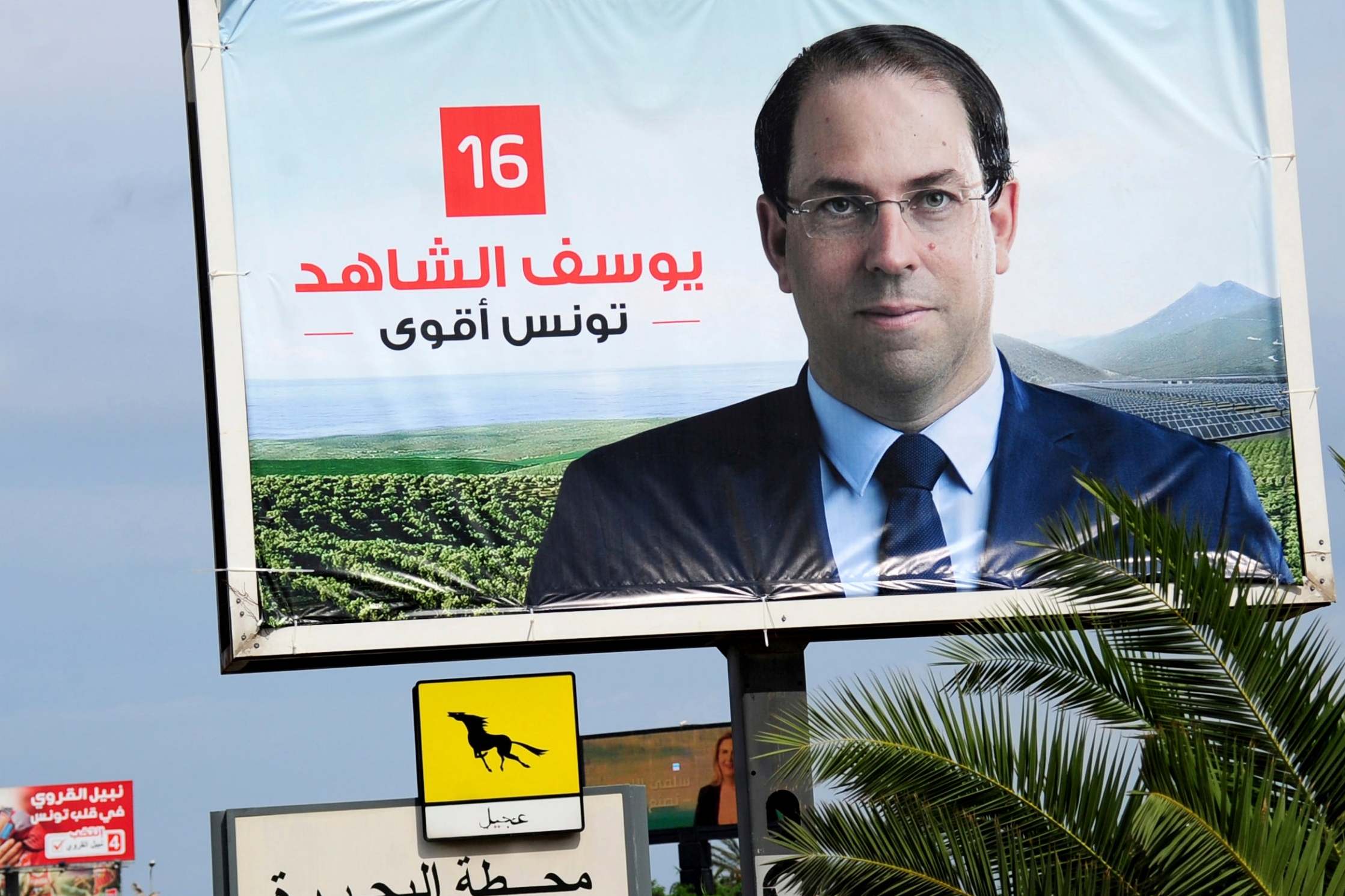Campaigning from prison and exile, outsiders take on the government for Tunisia’s top job
Analysis: After years of marginalisation many Tunisians are choosing to see upcoming contest as one between establishment class and fresh tranche of anti-system politicians

Your support helps us to tell the story
From reproductive rights to climate change to Big Tech, The Independent is on the ground when the story is developing. Whether it's investigating the financials of Elon Musk's pro-Trump PAC or producing our latest documentary, 'The A Word', which shines a light on the American women fighting for reproductive rights, we know how important it is to parse out the facts from the messaging.
At such a critical moment in US history, we need reporters on the ground. Your donation allows us to keep sending journalists to speak to both sides of the story.
The Independent is trusted by Americans across the entire political spectrum. And unlike many other quality news outlets, we choose not to lock Americans out of our reporting and analysis with paywalls. We believe quality journalism should be available to everyone, paid for by those who can afford it.
Your support makes all the difference.Drama continues to define the build-up to Tunisia’s presidential elections on Sunday, with the polls’ populist frontrunner and media mogul Nabil Karoui currently on hunger strike in prison, where he languishes on charges of tax evasion and money laundering, while another candidate, Slim Riahi, previously the general secretary of the country’s former ruling party, skulks in self-imposed exile in southern Europe.
Sunday’s election, the first of two, will be the second time ever the north African country has gone to the polls to cast its vote for president, and will be watched closely as a test for the region’s only 2011 Arab Spring success story.
It comes after the passing of former president, Beji Caid Essebsi, in late July.
The country is now struggling with an ailing currency, mounting foreign debt, entrenched unemployment and the constant threat of terrorism harrying its recovering tourism sector. Within the country’s overlooked hinterland, conditions are desperate, with unemployment in some areas thought to be as high as 30 per cent.
Despite a much vaunted war on corruption, spearheaded by presidential candidate and current prime minister Youssef Chahed, the perception across much of the country is one of an entrenched elite getting richer, while many are left to languish in poverty.
However, superficially at least, change is underway.
In a first for the region, presidential candidates appeared on a series of televised debates to compete for, rather than simply expect, the public’s vote. The result was television on a scale rarely seen in Tunisia’s modern history, with 11 of the country’s television channels carrying the debate, alongside 20 radio stations.
From an initial field of almost 100, including the Middle East’s first openly gay candidate, the field has been whittled down to 26, all of whom now vie for the position of head of state.
Appearing alongside relative outsiders, such as idiosyncratic law professor Kais Saied and Abir Moussi, an avowed apologist for Tunisia’s pre-revolutionary regime, were establishment stalwarts, Chahed, defence minister Abdelkarim Zbidi and the first presidential candidate to be fielded by moderate Islamists Ennahda, Abdelfattah Mourou.
In cafes around the capital, crowds spilled out onto the street as Tunisians gathered to watch their potential leaders trade in soundbites for the chance to proceed to the second round of voting, the date for which has yet to be announced.
Nevertheless, despite Karoui’s absence, rumours of private polls conducted by various international agencies suggest the momentum of his insurgent campaign may not have been dented by his absence. Across the country, the same anger that sparked the country’s 2011 revolution continues to fester and continues to fuel Nabil Karoui’s populist campaign.
Karoui has remained in detention since his arrest on 23 August, and he lost the second of two appeals for conditional release on Friday.
Speculation is rife, however, over the possibility of him both being found guilty and winning the presidency, presenting the country with a constitutional crisis that few ever foresaw. In the febrile atmosphere of the presidential campaign, much of the substance of the charges against Karoui and his brother, which were initially brought by anti-corruption watchdog, IWatch, in 2016, are often overlooked

In the build-up to the campaigning period, his television station Nessma TV made great play of images of Karoui distributing aid via his charitable association, Khalil Tounes, to the overlooked interior regions while railing against the shortcomings of Chahed and his government.
“Populists and outsiders benefit from the general discontent about the bad economic conditions,” Tunisian political analyst Youssef Cherif tells The Independent.
“They promise to change things and they point to the fact/claim that they have nothing to do with the current conditions, that they’ll do better. So people, in search of hope, believe them and fall for their rhetoric.”
Always perceived as something of a maverick, Riahi has yet to greatly trouble Tunisia’s political conscience.
He fled the country in November after he accused of Chahed and his immediate circle of plotting a coup d’etat. The charges were swiftly dismissed by the military court Riahi had lodged them with.
Populists and outsiders benefit from the general discontent about the bad economic conditions
However, the accusation reinforced the perception among parts of Tunisia’s political class who sought to portray the prime minister as a tyrant, a perception Karoui’s team made much play of during his campaign, significantly ratcheting up their denunciations of official complicity in the businessman’s arrest on 23 August.
Instead, Karoui’s supporters cast them, and the delay in bringing them to court, as further evidence of an orchestrated campaign to silence their “Nelson Mandela of Tunisia”.
Their claims are not entirely without substance.
In May, the outspoken television mogul had his channel taken off air after armed police raided his offices in central Tunis alleging breaches of broadcasting guidelines.
In July, shortly after Karoui established his lead in the last of the official polls, the government passed an electoral amendment that would have essentially precluded him and a small number of rival candidates from running for president, legislation that former President Essebsi declined to either sign into law or return to parliament before his death.
Irrespective of the claims of either camp, after years of marginalisation many within Tunisia are choosing to see the coming contest as one between the establishment class that has consistently overlooked them, and a fresh tranche of anti-system politicians that, like so many around the world, promise to rewrite the rulebook in their favour.
Join our commenting forum
Join thought-provoking conversations, follow other Independent readers and see their replies
Comments